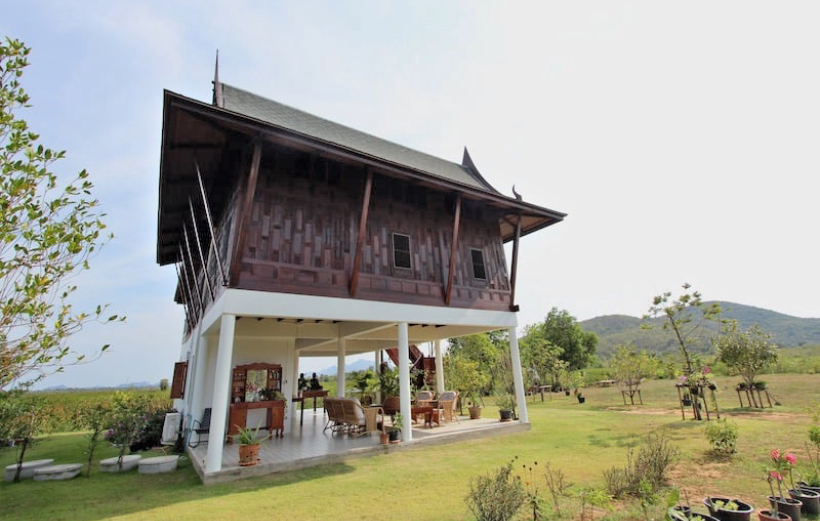Getting into the Thai property market, as a foreigner, is not for the faint-hearted. Many people have been burned and lost fortunes. Yes, some foreigners happily own a condo or lease land for a house, but their ‘ownership’ is at the mercy of the Thai legal system, future governments, and the team of lawyers and accountants who helped you with the deal.
To be clear, a house in your Thai spouse’s name, or a house you built on leased land, is NOT ‘owning’ a property.
There is a litany of horror stories of Thai-property-purchases-gone-wrong and you’d be well advised to become accustomed with people’s poor experiences as well as the good ones your agent will tell you about. Some developers have also cooked up convoluted ‘work arounds’ Thailand’s land ownership laws. These should generally be avoided unless you have the highest level of intelligent legal advice from a qualified Thai lawyer.
All that said, there are opportunities and an informed decision, well researched, can lead to an excellent outcome and a happy property ‘owner’, or lessor. But for many the risk/return ratio for the Thai property market, historically, just doesn’t add up. As a potential lifestyle decision, sure. As a safe, long-term investment, probably not.
Finally, since the middle of this year, the market has switched, in most locations, to a seller’s market, and the demand is high, spiking the pre-Covid prices. Russian and Chinese buyers have swept into the Thai property market in response to current geo-political issues.
But, say you’re just determined to get your hands on a slice of Thailand, for whatever are your personal circumstances, let’s go through some common mistakes people make when trying to own property in Thailand?
TITLE
When it comes to the title, you need to do a proper title search, over and above what you might expect in your home country. There has been some – let’s say – clever legal and accounting work with tiles in the past. If you’re buying from a developer you need to do a thorough check on their reputation, and the reputation of the agent selling the property. Many developers offer up to 10% commission on a sale… commission you’re paying over and above the actual value of the property.
The title search will also uncover liens on the property, like zoning and building restrictions.
I can’t stress the additional weight you should put on homework about your lawyer, developer and agent involved in your purchase.
GOING SOLO
It is possible to complete a property transaction without a lawyer. But, in Thailand, you’d be foolish to attempt an important purchase without some expert local advice – Thai property law can be quite different from some of the legal conventions you may be familiar with. That the documentation will be in Thai language is just the start of new challenges in buying property in Thailand.
DODGING THE AGENT
So, let’s dodge the agent’s commission and go directly to the developer or owner. In Thailand, that is not recommended. If you find a good agent… there are a few… stick with the larger businesses that have been operating in Thailand for many decades… then they will become an indispensable ally as you trudge through the swamp of properties available.
Do your own homework as well and make sure you get up to speed with what’s been happening in the market where you’re looking to buy. The more you know, the more you know.
DON’T BUY TOO SOON
When it comes to doing the deed, putting down a deposit, don’t be too hasty. There will be lots of pressure from the agent or developer… that’s their job. After all, they just want to sell the property and collect the commission, the earlier the better.
Get ALL your ducks in a row, chat with people you trust, double check the lawyer’s work. I promise, any time you spend checking every detail of the purchase BEFORE you pay the deposit is time well spent.
BUYING OFF-THE-PLAN
Don’t, just don’t. No matter how pretty the salesperson is, or how good the model of the proposed building is, keep walking.
BE PREPARED TO WALK AWAY
5 minutes on the internet will reveal thousands of horror stories about buying property in Thailand. In most cases, granted, they are failures of a lot of the points we’ve already made… people not doing proper due diligence, choosing the wrong lawyer, believing too much of the sales talk of a dodgy real estate agent.
But, if the money you’re going to use to buy a property, is the only money you have, consider the possibility, although slim, of losing the lot.
Sadly, there are unscrupulous agents and developers who have committed some serious crimes with property sales in Thailand – I’ve written about many of them and the sad stories of previously excited owners now spending years, and countless thousands of dollars to try and figure out how they were scammed out of their hard earned cash.
That doesn’t include the vast majority of honest people in the industry and happy new property owners, but you don’t want to end up as one of the headlines in an article I write about a property deal gone wrong.
CONVOLUTED “SCHEMES”
Because of the general restrictions of foreigners owning land in Thailand, many clever agents and developers have come up with any number of cunning ways to skirt the laws… and the spirit and intention of the laws.
They may promise you some form of ‘freehold’ with a long document involving lots of circles and arrows, third party companies, split payments and work-arounds. No matter how good these plans appear, the complexity of the scheme needs to be mirrored in the additional legal leg-work you need to do to know precisely what you’re getting yourself into.
OR JUST RENT INSTEAD
Or, do what so many others do in Thailand, and rent or lease a property. Invest your money in something perhaps less complicated, or perhaps in your own country. The risk/return ratio in Thai property may be more than it’s worth.
Renting will give you flexibility, a huge range of options and locations. Of course there can be hassles with landlords too. But, for peace of mind, renting where you live in Thailand will statistically give you a lot fewer headaches than trying to manipulate Thailand’s property laws in your favour.









